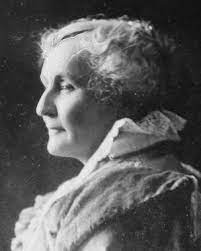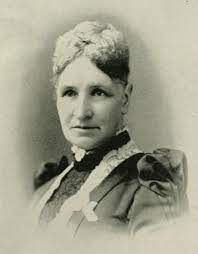|
|


|
Before Victorian times, pregnancy outside of wedlock was not considered a traumatic event; unwed mothers were known as women with a "bastard", the latter having no rights. Shame for the mothers came later.
In 1883, Charles Crittenton (above left) opened the Florence Crittenton Night Mission on Bleecker Street in NYC as a safe haven for homeless, abandoned, or abused women and unmarried mothers. Crittenton, a philanthropist and businessman, made Dr. Kate Barrett (above right) president of the Florence Crittenton mission when he died. Barrett also studied nursing in London. Both were opposed to adoption.
However, after the 1880s, the stigma of illegitimacy grew. One mother who went to Crittenton says that although the social workers there were not coercive, some of the mothers, aware of society's growing shame for illegitimate birth, were surrendering their children to a two-parent married couple for adoption.
Crittenton also opened and funded 51 such homes throughout the U.S. The Florence Crittenton homes were named in honor of his 4-year-old daughter, who died. Learn more at crittentonsocal.org/crittenton-history/
The Inwood House in upper Manhattan, established 1830, also housed unwed mothers. In 2016 they merged with The Children's Village, a children's support center, and provide services for young pregnant mothers and teen mothers to keep their babies.
Anchorage Institution for Wayward Girls
"The Anchorage was an Elmira [NY] home for 'wayward' girls," StarGazette.com, December 30, 2016
 |
THE COMING OF THE VICTORIAN ERA:
The three societal mores — secrecy, shame and denial — served to punish and silence unwed mothers. (See Prof. Elizabeth Samuels, Baltimore School of Law, for "Surrender and Subordination" and further information on her research.)
The Anchorage Institute for "erring and wayward girls" in Elmira, NY opened in 1890, founded by evangelical Christian women in their efforts to save the "fallen girls." The Anchorage president, Helen Bullock (above), was an organizer for the Women's Christian Temperance Union and a police matron. She traveled around the U.S. recruiting for the Union.
The Institute was not a maternity home but a religious reformatory where young girls and women were punished for minor infractions such as drunkenness, staying out past curfew, fornication, and various similar charges. There may have been some women there for prostitution also. But the unwed mothers were thrown in for the "crime" of out-of-wedlock pregnancy. Unless a family member of the mother took the child, the child went to an orphanage and was placed for adoption.
Although the population of Elmira at that time was only 30,893, the town was an important transportation hub, with many men coming into town looking for work. Because the population was small, it was easier for religious authorities to have control over its residents.
Maternity Home Experience
Carole L. Whitehead
Lakeview Home for Jewish Unwed Mothers
Louise Wise Services
My incarceration was served at the Lakeview Home for Jewish Unwed Mothers on Staten Island, a subsidiary of Louise Wise Adoption Services, New York City. I began serving time in January 1963; my sentence was commuted mid-Spring of the same year. It was one of the most frightening experiences of my life. Like most mothers who relinquished, the memories of that time were given over to repression to survive with one's sanity intact. The memories do come forward in bits and pieces...from time to time.
Lakeview forbade residents to disclose their true identities to fellow residents. I was known as Carole II in order not to "confuse" them with the Carol who had just departed the Home prior to my arrival. On the occasion I wore my high school sorority sweater, which also had my first name sewn on it, one resident informed me that she was familiar with my sorority and would be able to identify me. Inwardly, I smiled. It was important that my identity was known. It was my intention to leave the broadest physical and paper trail possible, so that one day, my unborn baby and I would be together again. I had accepted that going home with a baby was out of the question, but I also knew that years later my child and I would be reunited...a thought that sustained me, enabled me to tolerate what was happening to me while in that place.
Lakeview personnel treated us as non-entities. I felt as though we were in a reform school for girls and, perhaps, that was society's nomenclature too. The Home's primary purpose was to make the residents feel worthless. Their objective was to get all our babies. In combining the two, they made certain any thoughts of going out the door with our newborns were drummed out of our heads--from the day we arrived until our empty-handed, empty-hearted departure. Not one woman went home with her baby while I was there. The "professionals" harped on the premise that we were not good enough to be mothers to our children. Only women who were married and had husbands made ideal mothers.
The concept of residents doing chores in the Home was presented in a way that would, hopefully, elicit feelings of gratitude from the residents for taking us in, giving us shelter as well as medical care and the Home's version of "counseling."
We were visited by social workers and a psychiatrist. My first social worker was very pregnant and very married. About mid-way during my residence, she left to have her own baby who, I was very sure, went home with her and her husband after the birth. Although she was replaced, I cannot recall a single detail about the second social worker.
On occasion a doctor came to the Home to speak on health and our place in society. The "health" lectures were geared again to demean us. We were all from at least middle-class families; none of us were the dregs of the earth--yet we were spoken to as though we were to ensure our self-image of less than prevailed...lest one of us got a bright idea about being good enough to keep our baby. His lectures included toilet training, as in how to wipe one's self after defecating. Another lecture addressed how to bathe in great detail. We were told after washing our entire bodies, including our feet, only then should the vagina be cleansed. The implication being that vagina was the dirtiest part of our bodies.
In his lectures concerning our place in society, he informed us that we never had to tell anyone we had a baby prior to marriage--not our fiances, not our OB-GYNs. After all, if no one knew, we were marriageable material and, according to our lecturer, we would not see a doctor until after the marriage vows were exchanged. I told my husband on our second date. It's doubtful any of us knew at the time we didn't have to tell our doctors, an internal exam would tell it all.
My son was born six days before his due date. My parents were sick and tired of me being there. They were in a hurry for me to be separated from my son (their first grandchild who they refused to see) so they could pretend "it" never happened. We were all promised, of course, we would forget this "tragedy" had ever happened. To that end, the day before he was born, my parents gave me castor oil and orange soda to induce labor.
The next morning I notified the head of the Home my labor had begun with a bloody discharge. She was doubtful, and asked when the last time was I'd felt any discomfort or pain. "My back started to ache last night," I lied. Shortly thereafter, the labor began; the doubt disappeared.
I was taken to the hospital in a cab. Never have I felt so alone in my life as when the woman who accompanied me from the Home left me at the hospital by myself. I was truly frightened for, in all the "counseling" and lectures at the Home, the one thing they did not prepare us was childbirth. I knew nothing; had no concept of what would happen next.
The nurses in the Labor Room treated me with disdain. I was not out completely for the birth of my son. Against the Home's strenuous objections, I insisted on seeing, feeding, holding and naming him. I also had him circumcised. I will forever be thankful for having had the courage of my convictions then.
I cried my heart out over leaving my son behind after my discharge.
Although the time at Lakeview was the worst living nightmare of my life, the upside was having had time with my baby--and knowing he was mine.
We were manipulated into relinquishing and, in the process, robbed of our self-worth. It took years to regain any self-esteem. Some of the women I've met since then have returned to Staten Island to visit Lakeview as part of their healing process. I cannot. On the day my relinquishment papers were presented to me for signature, I vowed never to go back there (the Home or the New York City offices). The mere thought of having to go to Staten Island for any reason still causes feelings of anguish and anxiety. Simply having to cross the Verrazano-Narrows Bridge leading to Lakeview leaves me struggling for breath, anxiety in its purest form.
It's been more than 30 years since I left that place, but both Louise Wise and Staten Island still haunt me.
Finding my son 22 years after we separated has brought back many repressed memories. Slowly that is what heals me.
|





